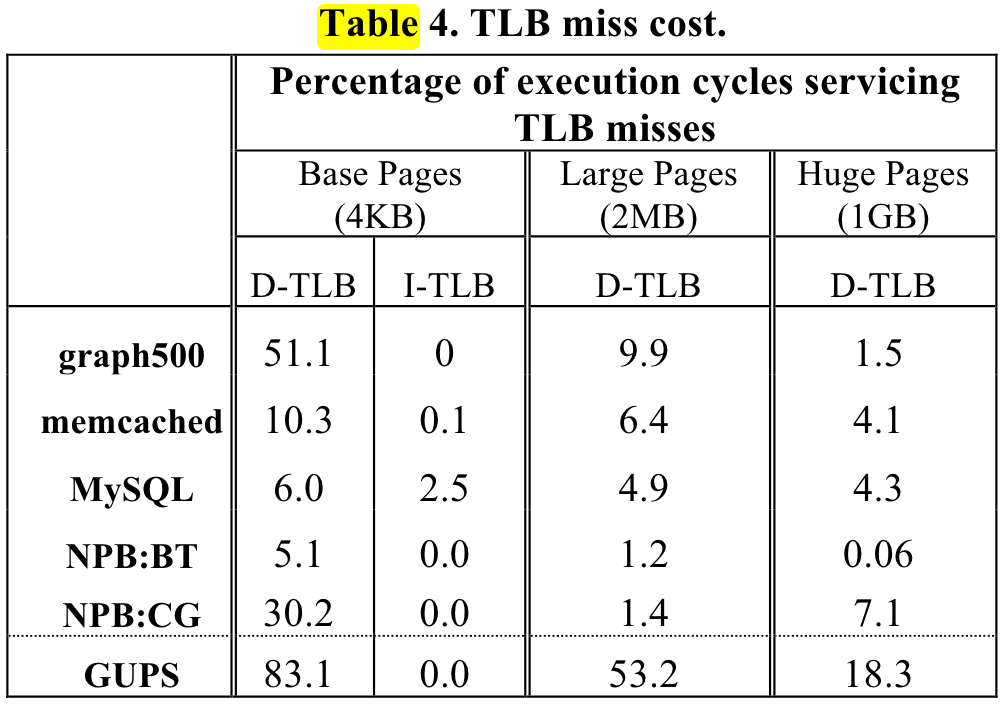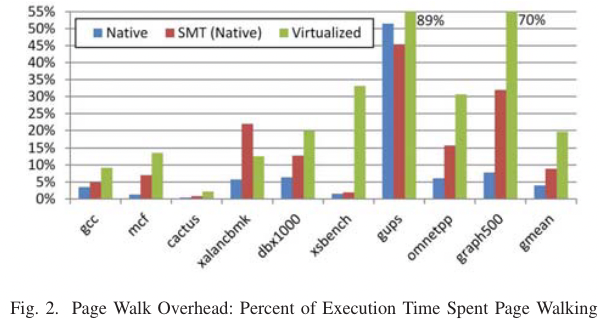TLB: real pagewalk overhead
简介¶
TLB的介绍,请看
页表相关¶
理论基础¶
大体上是应用访问越随机, 数据量越大,pgw开销越大。
ISCA 2013 shows the pgw overhead in big memory servers.
or ISCA 2020 Guvenilir 和 Patt - 2020 - Tailored Page Sizes.pdf
机器配置¶
# shaojiemike @ snode6 in ~/github/hugoMinos on git:main x [11:17:05]
$ cpuid -1 -l 2
CPU:
0x63: data TLB: 2M/4M pages, 4-way, 32 entries
data TLB: 1G pages, 4-way, 4 entries
0x03: data TLB: 4K pages, 4-way, 64 entries
0x76: instruction TLB: 2M/4M pages, fully, 8 entries
0xff: cache data is in CPUID leaf 4
0xb5: instruction TLB: 4K, 8-way, 64 entries
0xf0: 64 byte prefetching
0xc3: L2 TLB: 4K/2M pages, 6-way, 1536 entries
# if above command turns out empty
cpuid -1 |grep TLB -A 10 -B 5
# will show sth like
L1 TLB/cache information: 2M/4M pages & L1 TLB (0x80000005/eax):
instruction # entries = 0x40 (64)
instruction associativity = 0xff (255)
data # entries = 0x40 (64)
data associativity = 0xff (255)
L1 TLB/cache information: 4K pages & L1 TLB (0x80000005/ebx):
instruction # entries = 0x40 (64)
instruction associativity = 0xff (255)
data # entries = 0x40 (64)
data associativity = 0xff (255)
L2 TLB/cache information: 2M/4M pages & L2 TLB (0x80000006/eax):
instruction # entries = 0x200 (512)
instruction associativity = 2-way (2)
data # entries = 0x800 (2048)
data associativity = 4-way (4)
L2 TLB/cache information: 4K pages & L2 TLB (0x80000006/ebx):
instruction # entries = 0x200 (512)
instruction associativity = 4-way (4)
data # entries = 0x800 (2048)
data associativity = 8-way (6)
OS config¶
default there is no hugopage(usually 4MB) to use.
$ cat /proc/meminfo | grep huge -i
AnonHugePages: 8192 kB
ShmemHugePages: 0 kB
FileHugePages: 0 kB
HugePages_Total: 0
HugePages_Free: 0
HugePages_Rsvd: 0
HugePages_Surp: 0
Hugepagesize: 2048 kB
Hugetlb: 0 kB
explained is here.
设置页表大小¶
other ways: change source code¶
- way1: Linux transparent huge page (THP) support allows the kernel to automatically promote regular memory pages into huge pages,
cat /sys/kernel/mm/transparent_hugepage/enabledbut achieve this needs some details. - way2: Huge pages are allocated from a reserved pool which needs to change sys-config. for example
echo 20 > /proc/sys/vm/nr_hugepages. And you need to write speacial C++ code to use the hugo page
# using mmap system call to request huge page
mount -t hugetlbfs \
-o uid=<value>,gid=<value>,mode=<value>,pagesize=<value>,size=<value>,\
min_size=<value>,nr_inodes=<value> none /mnt/huge
without recompile¶
But there is a blog using unmaintained tool hugeadm and iodlr library to do this.
sudo apt install libhugetlbfs-bin
sudo hugeadm --create-global-mounts
sudo hugeadm --pool-pages-min 2M:64
So meminfo is changed
$ cat /proc/meminfo | grep huge -i
AnonHugePages: 8192 kB
ShmemHugePages: 0 kB
FileHugePages: 0 kB
HugePages_Total: 64
HugePages_Free: 64
HugePages_Rsvd: 0
HugePages_Surp: 0
Hugepagesize: 2048 kB
Hugetlb: 131072 kB
using iodlr library
应用测量¶
Measurement tools from code
# shaojiemike @ snode6 in ~/github/PIA_huawei on git:main x [17:40:50]
$ ./investigation/pagewalk/tlbstat -c '/staff/shaojiemike/github/sniper_PIMProf/PIMProf/gapbs/sssp.inj -f /staff/shaojiemike/github/sniper_PIMProf/PIMProf/gapbs/benchmark/kron-20.wsg -n1'
command is /staff/shaojiemike/github/sniper_PIMProf/PIMProf/gapbs/sssp.inj -f /staff/shaojiemike/github/sniper_PIMProf/PIMProf/gapbs/benchmark/kron-20.wsg -n1
K_CYCLES K_INSTR IPC DTLB_WALKS ITLB_WALKS K_DTLBCYC K_ITLBCYC DTLB% ITLB%
324088 207256 0.64 733758 3276 18284 130 5.64 0.04
21169730 11658340 0.55 11802978 757866 316625 24243 1.50 0.11
平均单次开销(开始到稳定): dtlb miss read need 24~50 cycle ,itlb miss read need 40~27 cycle
案例的时间分布:
- 读数据开销占比不大,2.5%左右
- pagerank等图应用并行计算时,飙升至 22%
- bfs 最多就是 5%,没有那么随机的访问。
- 但是gemv 在
65000 100000超内存前,即使是全部在计算,都是0.24% - 原因:访存模式:图应用的访存模式通常是随机的、不规则的。它们不像矩阵向量乘法(gemv)等应用那样具有良好的访存模式,后者通常以连续的方式访问内存。连续的内存访问可以利用空间局部性,通过预取和缓存块的方式减少TLB缺失的次数。
- github - GUOPS can achive 90%
- DAMOV - ligra - pagerank can achive 90% in 20M input case
gemm¶
- nomal gemm can achive 100% some situation
- matrix too big can not be filled in cache, matrix2 access jump lines so always cache miss
- O3 flag seems no time reduce, beacause there is no SIMD assembly in code
- memory access time = pgw + tlb access time + load data 2 cache time
the gemm's core line is
for(int i=0; i<N; i++){
// ignore the overflow, do not influence the running time.
for(int j=0; j<N; j++){
for(int l=0; l<N; l++){
// gemm
// ans[i * N + j] += matrix1[i * N + l] * matrix2[l * N + j];
// for gemm sequantial
ans[i * N + j] += matrix1[i * N + l] * matrix2[j * N + l];
}
}
}
and real time breakdown is as followed. to do
- first need to perf get the detail time
bigJump¶
manual code to test if tlb entries is run out
$ ./tlbstat -c '../../test/manual/bigJump.exe 1 10 100'
command is ../../test/manual/bigJump.exe 1 10 100
K_CYCLES K_INSTR IPC DTLB_WALKS ITLB_WALKS K_DTLBCYC K_ITLBCYC DTLB% ITLB%
2002404 773981 0.39 104304528 29137 2608079 684 130.25 0.03
$ perf stat -e mem_uops_retired.all_loads -e mem_uops_retired.all_stores -e mem_uops_retired.stlb_miss_loads -e mem_uops_retired.stlb_miss_stores ./bigJump.exe 1 10 500
Number read from command line: 1 10 (N,J should not big, [0,5] is best.)
result 0
Performance counter stats for './bigJump.exe 1 10 500':
10736645 mem_uops_retired.all_loads
532100339 mem_uops_retired.all_stores
57715 mem_uops_retired.stlb_miss_loads
471629056 mem_uops_retired.stlb_miss_stores
In this case, tlb miss rate up to 47/53 = 88.6%
Big bucket hash table¶
using big hash table
other apps¶
Any algorithm that does random accesses into a large memory region will likely suffer from TLB misses. Examples are plenty: binary search in a big array, large hash tables, histogram-like algorithms, etc.
需要进一步的研究学习¶
暂无
遇到的问题¶
暂无
开题缘由、总结、反思、吐槽~~¶
参考文献¶
上面回答部分来自ChatGPT-3.5,没有进行正确性的交叉校验。
无


